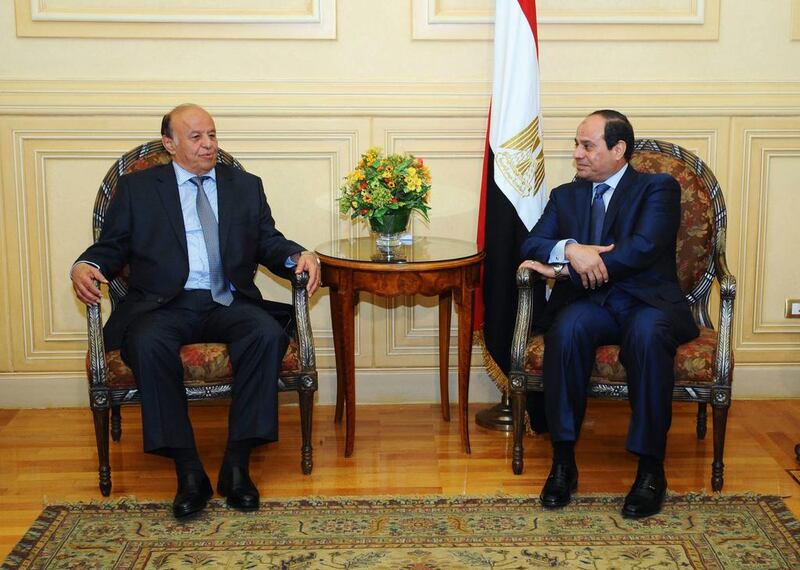SHARM EL SHEIKH // The Arab League meets on Saturday to finalise details of a draft resolution aimed at forming a joint military force that was agreed upon two days ago.
The talks are a sign of a new determination among Saudi Arabia, Egypt and their allies to intervene aggressively in regional hotshots, whether against militants or their rival Iran.
Creation of such a force has been a longtime goal that has eluded Arab nations in the 65 years since they signed a rarely used joint defence pact. And there remains reluctance among some countries, particularly allies of Iran like Syria and Iraq.
Foreign ministers gathered in Sharm El Sheikh ahead of the summit, which begins on Saturday, agreed on a broad plan for the force. It came as Saudi Arabia and its allies opened a campaign of airstrikes in Yemen against Iranian-backed Shiite rebels who have taken over much of the country and forced its US- and Gulf-backed president to flee abroad.
The Yemen campaign marked a major test of the new policy of intervention by the Gulf and Egypt. The crisis in Yemen — and Gulf fears that the rebels are a proxy for Iranian influence — have been one motivator in their move for a joint Arab force. But it also signalled that they are not going to wait for the Arab League, notorious for its delays and divisions, and will press ahead with their military coordination on multiple fronts.
In draft agreement on Thursday, the foreign ministers called on the chiefs of staff of the Arab League’s 22-member nations to meet within a month to iron out details of the force, like its budget and mechanism, and report back to the organisation.
The Egyptian military and security officials said the proposed force would be made of up to 40,000 elite troops and will be headquartered in either Cairo or Riyadh, the Saudi capital. The force would be backed by jet-fighters, warships and light armour.
Arab league officials said some Arab nations had reservations about the creation of a joint force, including Iraq, whose foreign minister, Ibrahim Al Jaafari, has counselled fellow ministers that more time was needed for planning. Iran holds massive influence with Iraq’s Shiite-led government and its military advisers are playing an active role in the fight by government troops and allied Shiite militias against ISIL militants.
Egypt’s president, soldier-turned-politician Abdel Fattah El Sissi, was the first Arab leader to speak publicly about the plan. In a recent address, he said there was a pressing need now for a joint Arab force and repeated his assertion that Egypt was prepared to intervene militarily in support of its Gulf Arab allies.
“The resolution sends a clear message that Arab nations can agree on a plan to defend themselves,” Arab League chief Nabil Elaraby told a news conference late Thursday in Sharm El Sheikh.
Egyptian foreign minister Sameh Shukri said the proposed force would undertake “quick and effective missions.”
Saudi Arabia, a staunch US ally, views Yemen as strategically important to its national security and has traditionally patronised key players there like top politicians, military commanders and tribal chiefs to protect its interests. It fought a brief border war against the Houthis in 2009. Similarly, Egypt views neighbouring Libya as vital to its own national interests. Last month, Egyptian warplanes struck ISIL positions in eastern Libya in retaliation for its mass beheading of 21 Coptic Christian Egyptians.
The creation of a joint military force, however, will streamline military actions like those undertaken by the Egyptians and Saudis in Libya and Yemen respectively, allowing future actions to be carried out under Arab League cover.
Egypt and its Gulf Arab allies have over the past year held a series of joint war games, including several in the Red Sea, a tactic that the Egyptian officials said was necessary to create harmony between members of the proposed force.
Already, the officials said, Egyptian troops are embedded with Saudi forces on the kingdom’s border with Iraq, about a third of which is controlled by ISIL. Egyptian military advisers are also deployed near Saudi Arabia’s border with Yemen.
As the crisis in Yemen worsened, Egypt has coordinated efforts with Sudan and Horn of Africa nation Eritrea to ensure the safety of shipping through the southern Bab Al Mandab entrance of the Red Sea, which Yemen overlooks.
* with reporting from Associated Press





